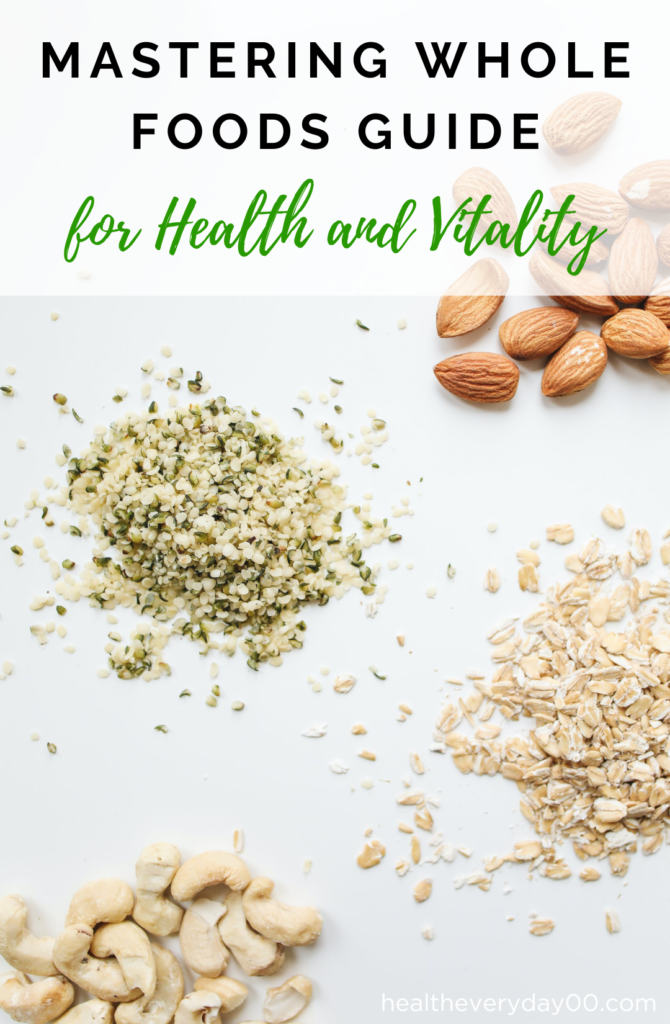Nourishing Your Life: Mastering Whole Foods for Health and Vitality

Introduction
Embracing a diet centred on whole foods is more than a culinary choice; it’s a deliberate decision to foster a healthier lifestyle. Whole foods, in their unprocessed and unrefined state, offer a treasure trove of essential nutrients, promising not just a satisfying meal but a path towards optimal health. As we navigate the labyrinth of modern diets, the call to return to nature’s bounty becomes increasingly compelling.
Whole foods, ranging from vibrant fruits and vegetables to wholesome grains and lean proteins, present an opportunity to redefine our relationship with what we consume. This shift isn’t merely about changing the contents of our plates but about sculpting a healthier, more nourishing lifestyle. Let’s explore how to seamlessly weave these nutrient-rich options into our daily meals and routines to fortify our bodies and uplift our well-being.
Understanding Whole Foods
Whole foods represent a natural, unprocessed, and unrefined category of food items that provide a wealth of essential nutrients without added artificial elements. These include an array of fruits, vegetables, whole grains, lean proteins, nuts, and seeds that retain their original, unaltered state from harvest to consumption.
1. The Significance of Unprocessed Nature
Whole foods, by nature, preserve their original form, without extraction, refinement, or artificial alteration. For instance, a whole apple contains the fruit, skin, seeds, and all the fiber intact, offering a combination of nutrients that may not be replicated in processed apple products.
2. Nutritional Density and Diversity
Whole foods are dense in nutrients, offering an abundance of vitamins, minerals, antioxidants, and fiber. Their unaltered state ensures the preservation of these essential nutrients, contributing to better health, improved digestion, and overall well-being.
3. Types of Whole Foods
- Fruits and Vegetables: These are among the primary sources of vitamins, minerals, and antioxidants, contributing to a strong immune system and overall health.
- Whole Grains: Whole grains such as quinoa, brown rice, and oats retain their bran, germ, and endosperm, offering more fiber, vitamins, and minerals compared to refined grains.
- Lean Proteins: Unprocessed proteins like poultry, fish, tofu, and legumes provide essential amino acids, aiding in muscle growth and repair.
- Healthy Fats: Nuts, seeds, avocados, and olive oil offer beneficial fats, vital for heart health and overall well-being.
4. Importance of Eating Whole Foods
- Balanced Nutrient Intake: Whole foods ensure a balance of essential nutrients, aiding in optimal bodily functions and reducing the risk of deficiencies.
- Digestive Health: Their high fiber content supports healthy digestion, preventing constipation and promoting gut health.
- Reduced Health Risks: Whole foods are linked to a reduced risk of chronic diseases, including heart disease, diabetes, and certain cancers.
Understanding the nature and significance of whole foods paves the way for making informed dietary choices that promote better health, sustained energy levels, and a stronger overall well-being. Incorporating these unprocessed, nutrient-rich foods into daily meals contributes to a balanced, nourishing diet that enhances the quality of life.
Practical Tips for Incorporating Whole Foods
Incorporating whole foods into your diet doesn’t have to be an overwhelming or abrupt change. Here are practical and effective tips to seamlessly introduce and embrace a more whole-food-based diet:
1. Shop Smart and Plan Meals
- Prioritize Fresh Produce: Shop for a variety of fresh fruits and vegetables. Aim for seasonal produce to maximize nutrient intake and diversity in your meals.
- Read Labels Carefully: When purchasing packaged items, focus on the ingredient list. Look for products with minimal processing and a short list of whole ingredients.
- Plan Weekly Meals: Devise a meal plan for the week ahead. Incorporate different whole foods to ensure a balanced and diverse diet. This also helps in reducing food waste.
2. Diversify Your Choices
- Try New Ingredients: Experiment with unfamiliar whole foods in your meals. Explore different grains, proteins, and produce to enjoy a wider range of nutrients.
- Substituting Processed Foods: Gradually replace processed snacks or convenience foods with healthier whole food alternatives. For example, swap chips for nuts or fresh fruit.
3. Introducing Whole Foods Gradually
- One Meal at a Time: Begin by introducing whole foods into one meal a day, such as swapping breakfast cereal for oatmeal or whole grain toast.
- Slow Transition: Gradually replace processed ingredients in your usual recipes with whole food alternatives. For instance, use whole wheat flour instead of refined flour.
4. Meal Prep for Convenience
- Pre-Cut and Store: Pre-cut fruits and vegetables to have them readily available for snacking or inclusion in meals.
- Batch Cooking: Prepare larger portions of whole-food-based dishes, such as soups or stews, and freeze individual portions for quick, healthy meals later on.
Recipes and Meal Ideas
By adopting these practical strategies, the process of integrating whole foods into your diet becomes more manageable and sustainable. These simple adjustments gradually transform your dietary habits, contributing to a healthier and more balanced lifestyle.
Incorporating whole foods into your meals can be both delicious and diverse. Here are appetizing meal ideas and recipes to add a burst of whole-food nutrition to your daily routine:
1. Breakfast
- Smoothie Bowls: Blend a mix of spinach, berries, bananas, and a spoon of chia seeds topped with granola, nuts, and fresh fruits for a nutritious morning kick-start.
- Overnight Oats: Mix oats with almond milk, Greek yogurt, and sliced fruits in a jar, refrigerate overnight, and enjoy a ready-to-eat, protein-packed breakfast in the morning.
- Avocado Toast: Top whole grain toast with mashed avocado, sliced tomatoes, a sprinkle of seeds, and a drizzle of olive oil for a satisfying and healthy morning option.
2. Lunch
- Colourful Salad: Toss a variety of mixed greens, cherry tomatoes, cucumbers, bell peppers, and chickpeas. Add grilled chicken or tofu for protein and drizzle with a homemade vinaigrette.
- Whole Grain Sandwich: Use whole grain bread layered with hummus, roasted vegetables, and a spread of mashed avocado for a hearty and filling lunch.
- Quinoa Bowl: Mix cooked quinoa with a medley of roasted vegetables, diced chicken, and a tangy dressing for a nourishing and vibrant lunch option.
3. Dinner
- Grilled Vegetables and Protein: Grill an assortment of vegetables (bell peppers, zucchini, mushrooms) with a side of lean protein like grilled chicken or fish seasoned with herbs and spices.
- Whole Grain Pasta: Use whole grain pasta with a homemade tomato sauce, cooked with spinach, onions, and garlic, and top it with grated parmesan for a delightful and fulfilling dinner.
- Hearty Soup: Prepare a vegetable or lentil-based soup loaded with a mix of whole vegetables, legumes, and herbs for a comforting and nutritious dinner choice.
These meal ideas are not only delicious but also allow for versatility and adaptability. Incorporating these whole-food recipes into your meal planning can significantly enrich your diet with essential nutrients, contributing to a healthier and more balanced lifestyle.
The Long-term Impact
Transitioning to a diet primarily composed of whole foods isn’t just a short-term change; it’s a commitment that reaps long-term benefits for overall health and well-being.
1. Sustaining a Whole Foods Diet
- Improved Nutrient Intake: Consistently consuming whole foods ensures a broad spectrum of essential nutrients, fostering better health and overall well-being.
- Steady Energy Levels: Whole foods, due to their nutrient density and balanced composition, contribute to sustained energy levels throughout the day, reducing energy slumps.
2. Benefits of a Balanced Lifestyle
- Enhanced Digestive Health: The high fiber content in whole foods supports digestive health, prevents constipation, and aids in maintaining a healthy gut microbiome.
- Long-term Disease Prevention: Incorporating whole foods is associated with a reduced risk of chronic diseases such as heart disease, diabetes, and certain cancers due to their nutritional richness.
3. Promoting Weight Management
- Satiety and Portion Control: Whole foods often contain more fiber and essential nutrients, promoting a feeling of fullness and aiding in better portion control.
- Lower Caloric Density: Whole foods, generally less processed and lower in calories, allow for a more substantial volume of food for fewer calories, supporting weight management efforts.
4. Mental and Emotional Well-being
- Increased Mental Clarity: A diet rich in whole foods may lead to improved mental clarity, cognitive function, and better focus.
- Mood Stability: Nutrient-dense whole foods can contribute to mood stability, offering a more balanced emotional state and reduced mood swings.
Adopting a whole foods-based diet not only shapes a better eating habit but significantly impacts the overall quality of life. It’s a step towards embracing a more balanced and nourishing lifestyle that brings about long-term health benefits.
Conclusion
The journey towards a whole foods diet isn’t just a dietary adjustment; it’s an affirmative step towards a healthier, more balanced life. Embracing whole foods is a celebration of nature’s offerings, and in this journey, we find not just sustenance but a gateway to vitality and well-being. With practical tips, delicious recipes, and an understanding of the long-term benefits, the integration of whole foods into our lives becomes not just an aspiration but an achievable and sustainable reality. Let us savour this journey towards a more nourished and harmonious lifestyle, relishing every wholesome bite for the betterment of our health and vitality.



